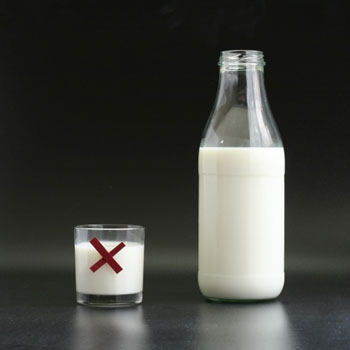Milk Mystery: Am I Lactose Intolerant?

Milk – it does a body good. Right? Well, not always.
Do you think you might have trouble digesting milk or milk products? Do you find yourself bloated or gassy after eating dairy? Are you left wondering “am I lactose intolerant?” Read on to find out more about the causes, signs and symptoms of lactose intolerance.
Your small intestine produces an enzyme called lactase. This enzyme is in charge of digesting and absorbing lactose, which is a sugar that can be found in milk and milk products. People with lactose intolerance may experience bloating, gas or diarrhea after eating or drinking milk products. These digestive symptoms may be so uncomfortable that people seek treatment and help.
Lactose intolerance shows itself in two ways: Lactose deficiency and lactase malabsorption. Lactose deficiency is a condition in which the small intestine makes very low levels of lactase and can’t process much lactose. Lactose malabsorption is a condition in which unabsorbed lactose passes to the colon. The colon is supposed to absorb water from a person’s stool and change it from a liquid to a solid. Here, bacteria is digested and broken down, and the undigested lactose is made into either fluid or gas.
Not everyone who has lactase malabsorption or lactose deficiency has lactose intolerance. Only those with digestive symptoms have lactose intolerance. Many people with lactase malabsorption and lactose deficiency can consume some milk products without issue. The amount of lactose people can tolerate varies.
Is It a Milk Allergy?
Often, people confuse lactose intolerance with an allergy to milk. Although lactase malabsorption and lactose deficiency are disorders, a milk allergy is more likely a reaction to milk proteins by the body’s immune system. An allergy to milk may show itself with the consumption of a small amount of milk or milk products, and just this tiny amount may be life-threatening. Milk allergies generally appear in the first year of life.
Four Types of Lactase Deficiency
Primary lactase deficiency: This condition is also referred to as “lactase non-persistence.” This is the most common type of lactase deficiency, showing in people whose lactase production has declined over time. Usually, this decline begins around age two but may show itself later in life. Children with lactase deficiency might not show symptoms until adulthood or adolescence.
Secondary lactase deficiency: In most cases, secondary lactase deficiency is caused by injury, infection, disease or other issues that affect small intestine. Sometimes, treating the cause of the problem helps the symptoms of lactose intolerance due to secondary lactase deficiency.
Developmental lactase deficiency: This condition may occur in premature babies. Usually, developmental lactase deficiency only lasts a short while after babies are born.
Congenital lactase deficiency: This disorder is an extremely rare case in which the small intestine produces very little lactase from the time of birth. This disorder is hereditary and present at birth.
Who Has Lactose Intolerance?
Generally, in the United States, a few racial and ethnic populations are more likely to exhibit lactose intolerance than others. The groups more likely to be affected are African Americans, Hispanic/Latinos, American Indians and Asian Americans. Lactose intolerance is less likely to occur in people of American or European descent.
Signs and Symptoms
Symptoms of lactose intolerance usually happen within 30 minutes to two hours after drinking milk or eating milk products or foods that contain lactose. The most common signs are diarrhea, abdominal cramping, bloating, nausea or vomiting, and gas. Most times, the symptoms are fairly mild, but there are instances when symptoms can be quite severe. The severity of symptoms often depends on the person’s level of intolerance and the amount of milk products the person consumed.
Continued Problems
Beyond being uncomfortable, lactose intolerance may cause further issues. People who are lactose intolerant sometimes may have trouble getting enough nutrients due to their intolerance. They may not consume enough vitamin D or calcium because milk and milk products are generally the most common sources of calcium and vitamin D. Those who are lactose intolerant may find themselves getting less than the desired amounts of these essential nutrients and may need to supplement.
Lactose Intolerance Risk Factors
There are certain factors that can increase the likelihood of having or developing lactose intolerance. Age is a major factor. It is uncommon for children to be lactose intolerant, but lactose intolerance tends to increase with age.
Ethnicity may play a role in the risk for lactose intolerance. Studies show some races appear to be more genetically disposed.
Those who were born prematurely are at an increased risk of the condition. This is because the enzyme lactase increases in production in the third trimester of pregnancy, so babies born early may have limited lactase production.
Anyone who suffers from small intestine diseases may be more likely to develop lactose intolerance. Diseases such as celiac disease, Crohn’s disease and bacterial overgrowth can affect a person’s lactose tolerance.
Finally, some treatments for cancer can cause lactose intolerance. Some develop intestinal troubles from chemotherapy, and radiation for abdominal cancers can increase risk of lactose intolerance.
Treatment, Diagnosis and Next Steps
If you feel you might be lactose intolerant, it’s a good idea to make an appointment with a doctor to get a clear diagnosis. Before you go, be prepared for your time with the doctor by writing down a list of the symptoms you’re experiencing and a list of medications you currently take.
Keeping a food diary for several days and writing everything you eat and how you feel afterward can help a doctor more accurately diagnose the cause of your symptoms and whether it is indeed lactose intolerance. Think of questions you might like to ask the doctor about your condition, and be sure to check to see if there is anything you need to do before the appointment, such as restricting what you eat.

